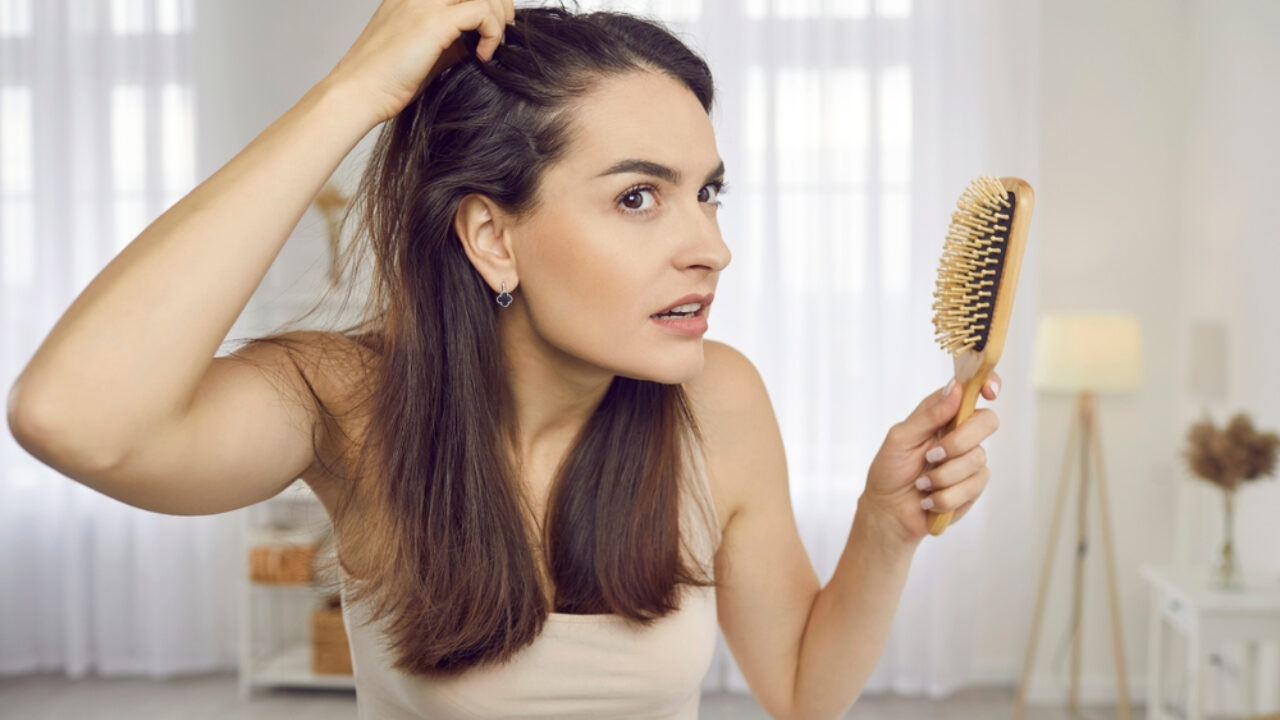Which Vitamin Deficiency Causes Hair Loss

Diet affects many aspects of health, including hair health. So, if you have thinning hair, you may wonder which vitamin deficit causes hair loss. Interestingly, hair loss is seldom caused by a lack of vitamins, while having too much of some vitamins might lead to thinning hair.1Hair loss may also be caused by a lack of protein or iron in the diet.
Continue reading to discover more about which vitamins cause hair loss, why hair loss occurs, and how to prevent it.
How Vitamin Deficiency Leads To Hair Loss

The vitamins and minerals you ingest affect the health of your hair follicles and growth cycle. However, the actual influence of vitamin consumption on hair loss is quite complicated and has not been well explored.2
Here's what we know about vitamin insufficiency, nutritional consumption, and hair loss.1
- Vitamin deficits do not usually result in hair loss.
- Excessive intake of some vitamins, such as vitamin A, may lead to hair loss.
- Low iron and protein levels may cause hair loss.
- Rapid weight loss (which may coincide with vitamin deficits) might result in hair loss.
The research on vitamin consumption and hair loss is scarce. Researchers have advocated for additional double-blind placebo trials to investigate the effects of vitamin and mineral consumption on hair loss.2
Read also:
- Best Hair Styling Cream You Must Try In 2024
- Top Hair Trends For 2024, From Butterfly Bobs To 70s Shag Cuts
- Mullet Haircuts For Men: 8 Looks Inspired By Korean Celebrities
- Top Trendy Shoulder-Length Hair Inspired
Vitamin deficiencies that may contribute to hair thinning and loss
Unfortunately, there aren't many definitive answers as to which vitamin shortages cause hair loss. However, this article will discuss what we do know about vitamin shortages and hair loss, as well as how nutritional consumption affects your hair.
B vitamins, biotin, and folate
B vitamins support several biological activities, including cell division.Biotin, a B7 vitamin, aids in energy conversion and cell communication.
Hair loss and shedding may be signs of biotin deficiency.3If you have a deficit, consuming biotin might help prevent hair loss.2
However, if you do not have a verified biotin deficit, using biotin tablets will not improve your hair loss.2Many people are surprised by this, given that many firms offer shampoos and other treatments containing biotin, claiming to promote hair health.
Vitamin D
Vitamin D promotes bone strength. Vitamin D insufficiency may lead to hair loss and rickets. Supplementing with vitamin D may assist with hair loss.2
Vitamin D deficiency has been linked to autoimmune disorders such as alopecia (hair loss). Supplementing with vitamin D until you are no longer insufficient may improve the prognosis and management of alopecia.2
Read also:
- Top Best Fringe Haircuts For Men According To Your Face Shape
- Best Hairstyles For Thin Hair To Look Thicker
- How To Select The Best Haircuts?
- Shag Haircuts: How Slightly Carelessness Has Become A Trend?
Iron
Iron is necessary for healthy red blood cells, which transport oxygen throughout the body. Inadequate iron intake may lead to anemia (low red blood cell count) and hair loss.4
If you are having hair loss, contact your doctor to examine you for low iron levels and supplement as required.2
Vitamin C
While vitamin C may not be directly linked to hair loss, it's important to ensure enough intake, particularly if experiencing hair loss due to low iron levels.2If you suffer hair loss due to iron deficiency, try to acquire enough vitamin C from citrus fruits, potatoes, peppers, and other foods high in this nutrient.
Zinc
Zinc is a trace mineral that promotes proper cell activity. Zinc deficiency is uncommon, although it is linked to alopecia. However, evidence on whether treating zinc deficiency will assist with alopecia symptoms, such as hair loss, is inconsistent.2
Vitamin E
Vitamin E supports the immune system and other biological processes. There is limited information on vitamin E and hair loss.2
Magnesium
Magnesium is a chemical element that promotes brain health. Hair loss is not a common indication of magnesium insufficiency, although some evidence suggests that magnesium supplementation might assist with hair loss in women with polycystic ovarian syndrome (PCOS)
Can too many vitamins lead to hair loss?
Hair loss may be caused by taking too much of a certain vitamin or mineral. Here are two that may cause hair loss.
Vitamin A
Vitamin A promotes cellular development. That may seem good for your hair, but too much vitamin A may trigger hair loss.1
What much of vitamin A is too much? Most individuals should ingest no more than 10,000 international units (IUs) of vitamin A per day. That's much more than you'd find in a usual diet. Consult your doctor if you experience hair loss after taking vitamin A supplements.
Read also:
- Mullet Haircut Is Back In Fashion
- Have a Frizz Free February with RPR Hair Care
Selenium
Selenium is a mineral that the body need in tiny levels. Some study suggests that selenium may aid with hair loss, notably in chemotherapy patients. However, having too much selenium may also result in hair loss. Never consume more than 400 IU of selenium per day.2
Summary
Vitamin deficiencies are seldom the cause of hair loss. However, not receiving enough iron and developing anemia may lead to hair loss. Excess vitamin A may also cause thinning hair. Unless you are deficient in a specific vitamin, supplementing with vitamins is unlikely to help with hair loss.
However, hair loss may be caused by a variety of factors, including hormonal changes, stress, and infections. If you're having hair loss, consult with your doctor, who can help you identify the reasons and establish a treatment plan that works for you.
